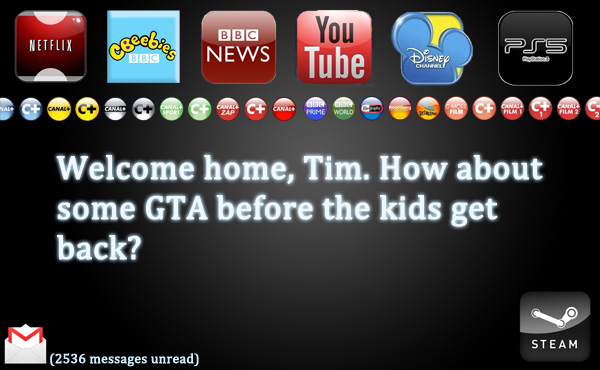I’m going to imagine it is 5 years from now. I’ve come home from work – not on a hover skateboard, I’m trying keep this realistic – and I switch on the telly…
<flurry of harp music, picture dissolves>
The family telly is one of those old Internet Protocol TVs (IPTV) and ever since we got round to telling it the wifi password a year or two back, life has changed.
My phone chirps up, ‘Hi Tim, want to finish watching episode 1014 of 30 Rock?’
I’m not sure that’s what I want. The screen shows a bunch of apps it knows I like.
‘No,’ I say to the TV (via my phone – I think- though might be via the dongle in the PS5). ‘What have you got that will make me feel better about myself?’
‘What about the ITV’s Massively Multiplayer Stay-at-Home-Pub-Quiz? The South Wilmslow region has 117 players right now. None of them seems especially clever. There’s a 78% probability you’d place in the top five. Also, there are four new hosts to choose from?’
It’s all irrelevant. I’m kicked off the big TV when the family come home, but I can still smile knowing I’ve set it up so the kids have to do 10 hard maths questions before they can access Netflix.
Maths problems solved, the kids play a game for a while but end up watching two shows, sharing half the screen each and listening to the audio via headphones plugged into their ASDA smartphones.
Meanwhile I’m making dinner. My tablet is stuck on the fridge door and has been recharged ethically off the hamster wheel.
<back to the present>
Is this how things might be? Will the nation suddenly twig that all their gizmos can link up? PVRs, tablets, set-top boxes, games consoles and – amazingly – even the dumb old TV.
‘New’ TV technologies in the past moved slowly. High Definition TV for example was being developed in the early 80s. But maybe a more savvy generation will demand a more rapid change. What will it mean for the big broadcasters like the BBC?
The thing that’s good about terrestrial broadcasting is that it handles very large and very small audiences with ease. TV over the internet requires expensive, powerful servers. A very popular show might conceivably crash the telly while simultaneously bankrupting the channel.
Yikes!
And it’s very likely we’re looking at the end of linear scheduling. Everything that isn’t live coverage might just be a title in a long list of on-demand options. Bad shows might not surface. It could render the concept of ‘prime time’ meaningless, it could be the death of Cash in the Attic.
Double-yikes!
Could be the end of branding things ‘BBC One’ and ‘BBC Two’ in the Programme Guide.
On a positive note, the improved two-way-ness of the technology might kick off a total renaissance in TV Quiz Shows (dare we dream?). Should we choose to use them, it might mean powerful new tools for a more open and immediate democracy.


Brilliant – especially that 30 Rock’s still running!
Hopefully there’ll still be producer roles in the future as freelancers and pension planning don’t go together that well…
[…] Perceptive Media is a combination of a few trends, pulled together to make sense of this convergence happening in our living rooms, as Tim has already pointed out. […]
I love the idea of setting tests for the kids before they can access content, but there’ll always be a place for ‘Cash in the Attic’ ;o)
I sort of dread/long for the day Cash in the Attic has people collecting ancient curios like minidisc players and ON digital set top boxes.